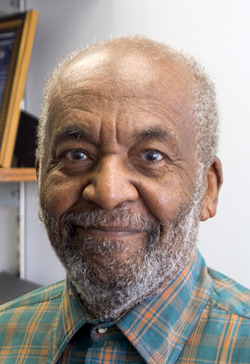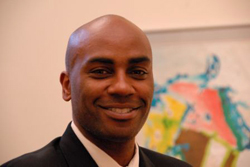Filed Under > TC People
A New Leader at IUME
Ernest Morrell will lead TC's signature urban institute into a new era
By Patricia Lamiell
Teachers College has appointed Ernest Morrell as the new director of its Institute for Urban and Minority Education (IUME). Morrell is on the faculty in the Urban Schooling Division of the Graduate School of Education and Information Studies at the University of California at Los Angeles (UCLA). He will assume a tenured full professorship at TC and the directorship of IUME offices in September, succeeding the Institute’s founding director, Edmund W. Gordon.
“His appointment is an important event for TC, and we are fortunate to be bringing such a talented leader to our academic community,” said Provost and Dean Thomas James.
Morrell has made his mark in higher and secondary education in Los Angeles and beyond. At UCLA, he has done research and teaching in the fields of literacy, critical pedagogy, cultural studies, urban education and ethnic studies. As Associate Director of UCLA’s Institute for Democracy, Education, and Access (IDEA), he has worked with high school students in Los Angeles on in-school and out-of-school literacy instruction, cultural studies, and civic involvement. Through IDEA he has taken busloads of teenage students to the state capital, Sacramento, to lobby for more state support of education.
Morrell’s interest in urban minority education was a natural progression from a childhood spent mostly in Oakland, California, where his mother taught school and his father was a preacher. Morrell earned his bachelor’s degree in English at the University of California at Santa Barbara, and returned to Oakland to teach high school English and coach. While earning a doctorate in language, literacy and culture at neighboring Berkeley, he developed a scholarly interest in school reform and community engagement in education. Since then, he has worked to discover what teaching methods work for urban and minority students – and, he said in a recent interview, “what would this effective pedagogy look like in context? What would make it more possible, what do teachers, schools of education, and policymakers need to do?”
These are questions that IUME has been asking since its creation in 1973. The Institute’s founding premise was that, in order to succeed on par with their wealthier peers, urban minority children need excellent teaching and extra, out-of-school supports to compensate for deficiencies in their environment. An important mandate at IUME was to research how race, gender, language, and social and economic class affected learners, and then use the research to powerfully influence curriculum, pedagogy and student assessment. During the 1980s, under the direction of Charles Harrington, currently Professor of Anthropology, Psychology and Education, IUME was the largest research and development unit of Teachers College, taking in substantial federal and private dollars. More important, it was TC’s face in Harlem.
Professor Edmund W. Gordon, Founder and Director Emeritus of IUME expressed enthusiasm for the appointment.
“Professor Ernest Morrell is an excellent choice for appointment as the next Director of IUME,” Dr. Gordon said. “I have known Dr. Morrell since he served as a post- doctoral fellow in a program that I directed some ten years ago. Ernest showed great promise at that time. He has gone on to distinguish himself as a teacher, as a scholar and as an activist. His research interests complement the IUME mission. Morrell is a smart, gentle and powerful presence. Teachers College is fortunate to be able to attract him from UCLA.”
Gordon moved to Yale in 1979, opening the director's seat to a series of scholars including Harrington, Dorothy Strickland, Charles Harrington, Joseph Grannis, Francisco Rivera-Batiz and Erwin Flaxman. As the institute grew, it began offering technical assistance to schools and districts that were responding to legal desegregation mandates, or helping them reduce bias in the curriculum, testing, classroom and school organization, and interpersonal relations. As a TC-based institute, IUME also prepared TC students to teach in urban settings.
Gordon returned as director in 2001 having established himself as one of the first academics to focus on the achievement gap between students of color and immigrants, and their higher-achieving European or Asian-American peers, and on the impact of out-of-school, supplementary instruction and learning.
With offices on 125th Street in Harlem, the institute to this day has the same central goal: to understand and uncouple the relationship between a person’s assigned social group and education outcomes. IUME continues to conduct scholarly research into identifying the characteristics and life conditions of high academic achievers among ethnic and minority students. It also provides direct school and community service such as after-school programs as well as technical assistance to schools – support which is still badly needed in Harlem and in poor neighborhoods across the country.
“We are in a moment where we are battling for control of the discourse of education,” Morrell said, “where many different people are speaking about education from many standpoints, many using the language of failure of students, families, teachers and schools, and it's dispiriting. Education research has the opportunity to speak back, he said, but it needs to speak more powerfully and spotlight examples of classroom or school-wide practices that are working or show promise.
“We have tens of thousands, if not hundreds of thousands, of teachers in America who are highly effective every day, and we don't go inside their classrooms and figure out what they're doing. I think we need to do that.”
Morrell hopes to put his own stamp on IUME by taking it beyond Harlem, and by assembling a national organization of young people who will “storm Washington” and advocate for themselves and their own education.
Morrell said his philosophy, developed while he worked with Jeannie Oakes, director of education and scholarship at the Ford Foundation and a former director of IDEA, fits well at UCLA, at TC, and at universities and education schools in between.
“How does a university research institution fulfill its mission of conducting research while also engaging the community in the process of advocating for social change?” he asked rhetorically.
As in the past, IUME seems likely to point the way.
To see a video interview with Professor Ernest Morrell, go to http://bit.ly/hU7rIG.
Published Monday, Feb. 7, 2011

